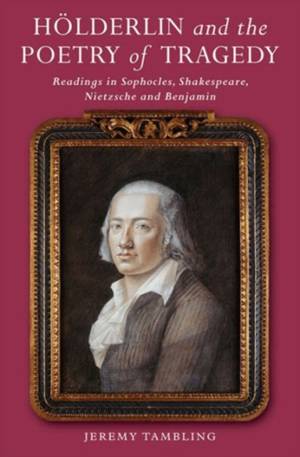
- Retrait gratuit dans votre magasin Club
- 7.000.000 titres dans notre catalogue
- Payer en toute sécurité
- Toujours un magasin près de chez vous
- Retrait gratuit dans votre magasin Club
- 7.000.0000 titres dans notre catalogue
- Payer en toute sécurité
- Toujours un magasin près de chez vous
Hölderlin and the Poetry of Tragedy
Readings in Sophocles, Shakespeare, Nietzsche & Benjamin
Jeremy Tambling
Livre broché | Anglais
45,45 €
+ 90 points
Format
Description
Hölderlin (1770-1843) is the magnificent writer whom Nietzsche called 'my favourite poet'. His writings and poetry have been formative throughout the twentieth century, and as influential as those of Hegel, his friend. At the same time, his madness has made his poetry infinitely complex as it engages with tragedy, and irreconcilable breakdown, both political and personal, with anger and with mourning. This study gives a detailed approach to Hölderlin's writings on Greek tragedy, especially Sophocles, whom he translated into German, and gives close attention to his poetry, which is never far from an engagement with tragedy. Hölderlin's writings, always fascinating, enable a consideration of the various meanings of tragedy, and provide a new reading of Shakespeare, particularly Julius Caesar, Hamlet and Macbeth; the work proceeds by opening into discussion of Nietzsche, especially The Birth of Tragedy. Since Hölderlin was such a decisive figure for Modernism, to say nothing of modern Germany, he matters intensely to such differing theorists and philosophers as Walter Benjamin, Theodor Adorno, Martin Heidegger, Maurice Blanchot and Jacques Derrida, all of whose views are discussed herein. Drawing upon the insights of Hegelian philosophy and psychoanalysis, this book gives the English-speaking reader ready access to a magnificent body of poetry and to the poet as a theorist of tragedy and of madness. Hölderlin's poetry is quoted freely, with translations and commentary provided. This book is the first major account of Hölderlin in English to offer the student and general reader a critical account of a vital body of work which matters to any study of poetry and to all who are interested in poetry's relationships to madness. It is essential reading in the understanding of how tragedy pervades literature and politics, and how tragedy has been regarded and written about, from Hegel to Walter Benjamin.
Spécifications
Parties prenantes
- Auteur(s) :
- Editeur:
Contenu
- Nombre de pages :
- 272
- Langue:
- Anglais
Caractéristiques
- EAN:
- 9781845197094
- Date de parution :
- 01-01-15
- Format:
- Livre broché
- Format numérique:
- Trade paperback (VS)
- Dimensions :
- 152 mm x 226 mm
- Poids :
- 521 g

Les avis
Nous publions uniquement les avis qui respectent les conditions requises. Consultez nos conditions pour les avis.






